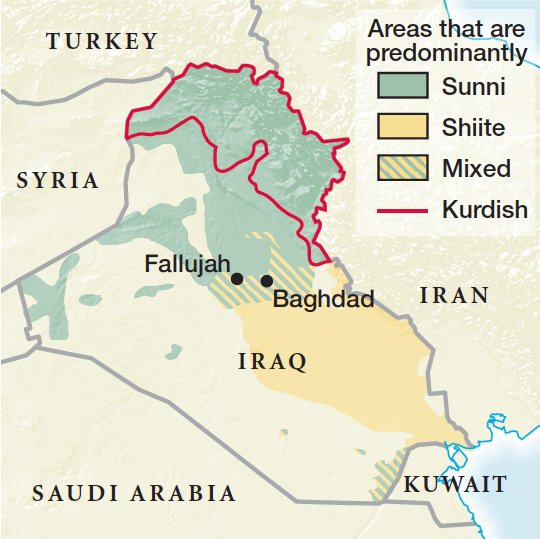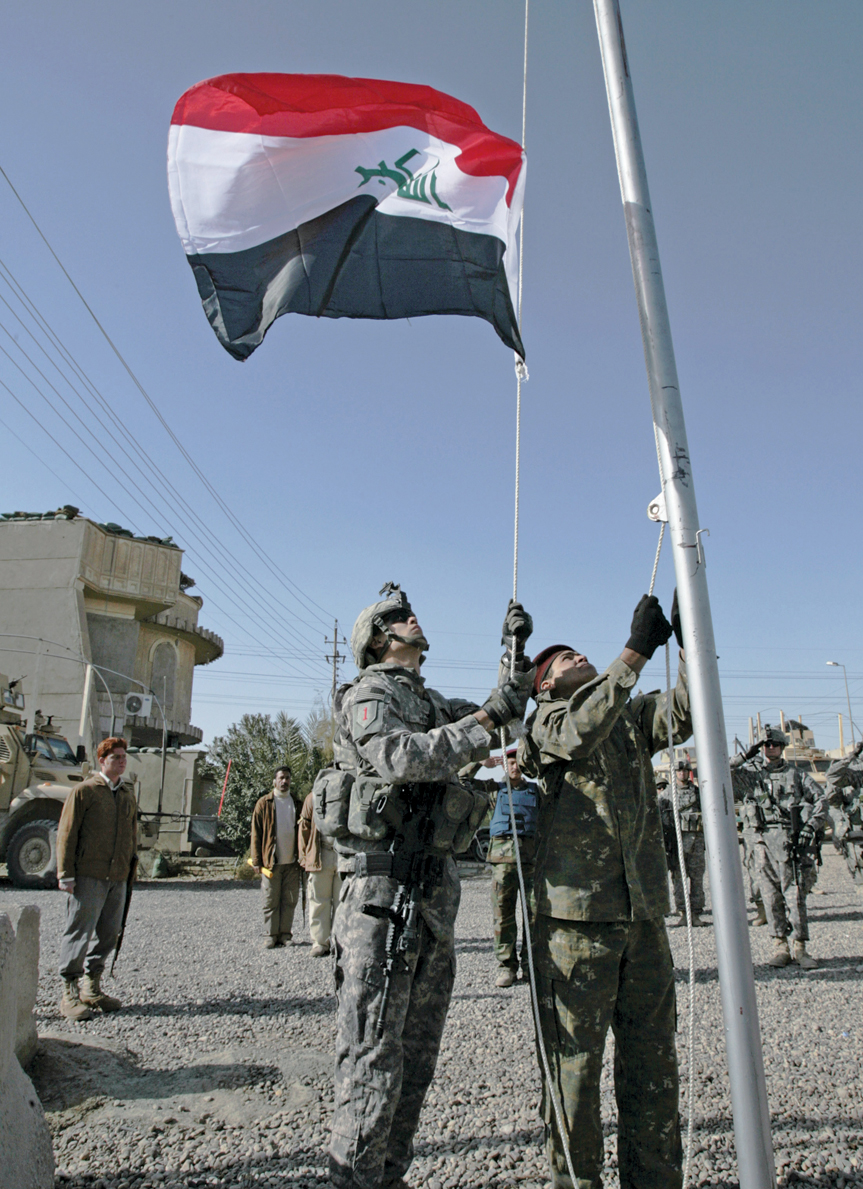Unilateralism, Preemption, and the Iraq War.
Printed Page 872 Chapter Chronology
Unilateralism, Preemption, and the Iraq War. The Bush administration sought collective action against the Taliban, but on most other international issues it adopted a go-it-alone approach. In addition to withdrawing from the Kyoto Protocol on global warming and violating international rules about the treatment of military prisoners, it scrapped the 1972 Antiballistic Missile Treaty in order to develop the space-based Strategic Defense Initiative first proposed by Ronald Reagan. Bush also withdrew the nation from the UN's International Criminal Court, and he rejected an agreement to enforce bans on biological weapons — an agreement signed by all of America's European allies.
Nowhere was the policy of unilateralism more striking than in a new war against Iraq, a war endorsed by Vice President Dick Cheney and Secretary of Defense Donald H. Rumsfeld, but not by Secretary of State Colin Powell. Addressing West Point graduates in June 2002, President Bush proclaimed a new security strategy based not on containment but on preemption: "Traditional concepts of deterrence will not work against a terrorist enemy whose avowed tactics are wanton destruction and the targeting of innocents; whose so-called soldiers seek martyrdom in death and whose most potent protection is statelessness." Because nuclear, chemical, and biological weapons enabled "even weak states and small groups [to] attain a catastrophic power to strike great nations," the United States had to "be ready for preemptive action." The president's claim that the United States had the right to start a war was at odds with international law and with many Americans' understanding of their nation's ideals. It distressed most of America's great-power allies.
Nonetheless, the Bush administration soon applied the doctrine of preemption to Iraq, whose dictator, Saddam Hussein, appeared to be violating UN resolutions from the 1991 Gulf War restricting Iraqi development of nuclear, chemical, and biological weapons. In November 2002, the United States persuaded the UN Security Council to pass a resolution demanding that Iraq disarm or face "serious consequences." When Iraq failed to comply fully with new UN inspections, the Bush administration decided on war. Making claims (subsequently refuted) that Hussein had links to Al Qaeda and harbored terrorists and that Iraq possessed weapons of mass destruction, the president insisted that the threat was immediate and great enough to justify preemptive action. Despite opposition from the Arab world and most major nations — including France, Germany, China, and Russia — the United States and Britain invaded Iraq on March 19, 2003, supported by some thirty nations (see Map 31.1). Coalition forces won an easy victory, and Bush declared the end of the Iraq War on May 1. Saddam Hussein remained at large until December 2003.
Iraq War
War launched by the United States, Britain, and several smaller countries in March 2003 against the government of Iraqi dictator Saddam Hussein. It was based on claims (subsequently refuted) that Hussein's government had links to Al Qaeda, harbored terrorists, and possessed weapons of mass destruction.

Chaos followed the quick victory. Damage from U.S. bombing and widespread looting resulting from the failure of U.S. troops to secure order and provide basic necessities left Iraqis wondering how much they had gained. "With Saddam there was tyranny, but at least you had a salary to put food on your family's table," said a young father. A Baghdad hospital worker complained, "They can take our oil, but at least they should let us have electricity and water." Five years after the invasion, continuing violence had caused 2 million to flee their country and displaced 1.9 million within Iraq.
The administration had not planned adequately for the occupation and failed to send sufficient troops to Iraq. The 140,000 American forces there came under attack almost daily from remnants of the former Hussein regime, religious extremists, and hundreds of foreign terrorists now entering the chaotic country. Seeking to divide Iraqis and undermine the occupation, terrorists launched deadly assaults resulting in the death of tens of thousands of Iraqis. By the end of the Iraq War, nearly 4,500 U.S. soldiers had lost their lives, and many returned home grievously wounded.
The war became an issue in the presidential campaign of 2004. Massachusetts senator John Kerry, the Democratic nominee, criticized Bush's unilateralist foreign policy and the administration's conduct of the war. A slim majority of voters, however, indicated their belief that Bush would better protect American security than Kerry. The president eked out a 286 to 252 victory in the electoral college, winning 50.7 percent of the popular vote and carrying Republican majorities into Congress.

In June 2004, the United States transferred sovereignty to an interim Iraqi government, and in January 2005 Iraqis elected a national assembly, which then had to organize a government satisfactory to Iraq's three major groups — Sunnis, Shiites, and Kurds. Violence escalated against government officials, Iraqi civilians, and occupation forces. A nineteen-year-old Iraqi confined to his house by his parents, who feared he could be killed or lured into terrorist activities, said, "If I'm killed, it doesn't even matter because I'm dead right now." By 2006, a majority of Americans told pollsters that the Iraq War was a mistake.
By 2006, Bush's conduct of the war faced criticism that crossed party lines and included military leaders. Critics acknowledged that the United States had felled a brutal dictator, but coalition forces were not large enough or adequately prepared for the turmoil that followed. Nor did they find the weapons of mass destruction or links to Osama bin Laden that administration officials had insisted made the war necessary. Rather, in the chaos induced by the invasion, more than a thousand terrorists entered Iraq — the place, according to one expert, "for fundamentalists to go ...to stick it to the West."
The war and occupation exacted a steep price in American and Iraqi lives, dollars, U.S. relations with other great powers, and the nation's reputation in the world, especially among Arab nations. Revelations of prisoner abuse in the Abu Ghraib prison in Iraq and in the Guantánamo detention camp housing captives from the Afghan war further tarnished the image of the United States. Anti-Americanism around the world rose to its highest point in history. The budget deficit swelled, and resources were diverted to Iraq from other national security challenges, including the stabilization of Afghanistan, the elimination of bin Laden and Al Qaeda, and the threats posed by North Korea's and Iran's pursuit of nuclear weapons.
Voters registered their dissatisfaction in 2006, when Democrats captured both houses of Congress for the first time since 1994. The Bush administration displayed more willingness to work with other nations in dealing with Iraq, Iran, and North Korea. In 2007, it began a troop surge in Iraq, increasing U.S. forces there to 160,000. The surge, along with actions by Iraqi leaders, contributed to a significant reduction in violence, and the administration began planning for the withdrawal of U.S. forces, which was completed at the end of 2011.